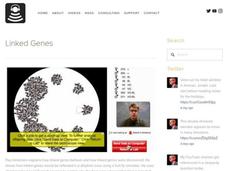Bozeman Science
Meselson-Stahl Experiment
One human's entire DNA sequence would take up three gigabytes of storage space. Pupils explore the experiment performed by Meselson-Stahl, which proved DNA copied itself through a semi-conservative process. The instructor explains their...
Bozeman Science
Mechanisms that Increase Genetic Variation
Learn how genetic variation occurs within prokaryotes through transformation, transduction, and conjugation. The instructor then explains how sexual reproduction in eukaryotes can lead to crossing over, random assortment, and random...
Bozeman Science
Linked Genes
Scholars analyze Morgan's fruit fly lab to learn how genes are linked. The instructor shows that the data from a dihybrid cross was not what Morgan expected, and when re-crossed numerous times, the data did not change. Viewers see gene...
Bozeman Science
Hardy-Weinberg Equation
Dark, curly, non-red, and thick hair are all dominant genes. The video begins by defining phenotype, genes, alleles, and genotype. Scholars learn how alleles determine genotype, which directs phenotype, using red hair as the example. The...
Bozeman Science
Genotypes and Phenotypes
Complete heterochromia is a mutation that causes a person to have two different colored eyes. Class members explore how genotypes affect phenotypes. The instructor shows how changes in DNA can occur via mistakes in replication,...
Bozeman Science
Genotype Expression
Did you know that arctic hare have black eyelashes that protect their eyes from the sun? Scholars learn how genotypes are either expressed or not, based on environmental factors. The narrator explores how the Himalayan rabbit, the...
Bozeman Science
Genetic Recombination and Gene Mapping
Young scientists explore genetic recombination and gene mapping through analyzing the works of Thomas Hunt Morgan and Alfred Sturtevant. Individuals see how some genes, via fruit flies, can cross over creating greater variation, which...
Bozeman Science
Gene Regulation
If someone recited the ATCG sequence of their DNA without taking a break, they would speak for 57 years. High school pupils learn three new terms related to gene regulation: regulatory gene, regulatory sequence, and promoter. Individuals...
Bozeman Science
DNA and RNA - Part 2
Viewers explore the structures of RNA and DNA and then learn how DNA replicates itself. The narrator explains the central dogma, showing how DNA is eventually translated into proteins, before briefly discussing genetic engineering.
Bozeman Science
Chromosomal Genetics
The instructor in a biology video defines and shows examples of incomplete dominance, codominance, epistasis, and multiple alleles. Viewers then explore Thomas Hunt Morgan and his crosses showing the discovery of gene linkage via fruit...
Bozeman Science
DNA and RNA - Part 1
Explore the history of DNA through Griffith, Avery, and Watson and Crick. The narrator of a science video briefly covers how DNA is organized in prokaryotic and eukaryotic organisms.
Crash Course
Eukaryopolis - The City of Animal Cells
The narrator of this video relates animal cells and their organelles to a city. He then explains what the organelles do for cells, where they are located, and why they are important.
Crash Course
Biological Molecules - You Are What You Eat
Low carb diets really go against the grain. All organisms need to either synthesize or ingest three molecules: carbohydrates, lipids, and proteins. Great visuals in this video explore the make-up and importance of each of these...
Crash Course
Water - Liquid Awesome
If H2O is water and H2O2 is hydrogen peroxide, what is H2O4? Drinking, bathing, and cooking among others. Viewers of a short video explore water through its molecular structure, its ability to stick to itself through adhesion (cohesion...
Bozeman Science
Gibbs Free Energy
Energy is neither created nor destroyed, but what about free energy? Where does that fit into thermodynamics? In the video, learners explore simple the spontaneous reaction examples of enthalpy, entropy, and temperature, and then apply...
Bozeman Science
Positive and Negative Feedback Loops
A video explains both positive and negative feedback loops including body temperature, ripening fruit, and diabetes. An accompanying worksheet helps organize scholar's notes.















